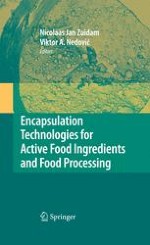The history of the role of probiotics for human health is one century old and several definitions have been derived hitherto. One of them, launched by Huis in’t Veld and Havenaar (
1991) defines probiotics as being “mono or mixed cultures of live microorganisms which, when applied to a man or an animal (e.g., as dried cells or as a fermented product), beneficially affect the host by improving the properties of the indigenous microflora”. Probiotics are living microorganisms which survive gastric, bile, and pancreatic secretions, attach to epithelial cells and colonize the human intestine (Del Piano et al.
2006). It is estimated that an adult human intestine contains more than 400 different bacterial species (Finegold et al.
1977) and approximately 10
14 bacterial cells (which is approximately ten times the total number of eukaryotic cells in the human body). The bacterial cells can be classified into three categories, namely, beneficial, neutral or harmful, with respect to human health. Among the beneficial bacteria are
Bifidobacterium and
Lactobacilli. The proportion of bifidobacteria represents the third most common genus in the gastrointestinal tract, while
Bacteroides predominates at 86% of the total flora in the adult gut, followed by
Eubacterium. Infant-type bifidobacteria
B. bifidum are replaced with adult-type bifidobacteria,
B. longum and
B. adolescentis. With weaning and aging, the intestinal flora profile changes. Bifidobacteria decrease, while certain kinds of harmful bacteria increase. Changes in the intestinal flora are affected not only by aging but also by extrinsic factors, for example, stress, diet, drugs, bacterial contamination and constipation. Therefore, daily consumption of probiotic products is recommended for good health and longevity. There are numerous claimed beneficial effects and therapeutic applications of probiotic bacteria in humans, such as maintenance of normal intestinal microflora, improvement of constipation, treatment of diarrhea, enhancement of the immune system, reduction of lactose-intolerance, reduction of serum cholesterol levels, anticarcinogenic activity, and improved nutritional value of foods (Kailasapathy and Chin
2000; Lourens-Hattingh and Viljoen
2001; Mattila-Sandholm et al.
2002). The mechanisms by which probiotics exert their effects are largely unknown, but may involve modifying gut pH, antagonizing pathogens through production of antimicrobial and antibacterial compounds, competing for pathogen binding, and receptor cites, as well as for available nutrients and growth factors, stimulating immunomodulatory cells, and producing lactase (Kopp-Hoolihan
2001).
